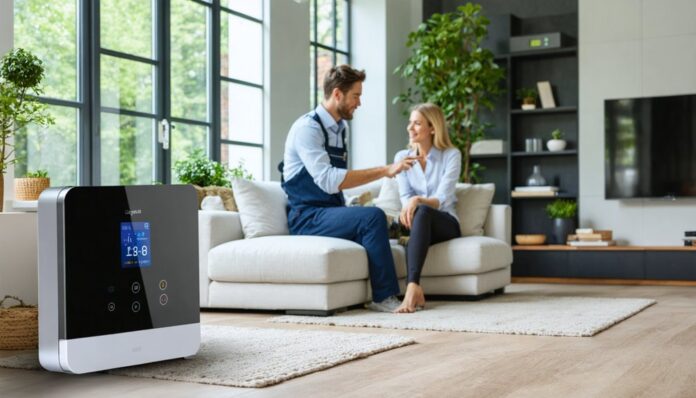Selecting the ideal HVAC system for a home can be a daunting task, but understanding key factors can simplify the process. Homeowners must consider their specific heating and cooling needs, taking into account elements like square footage and local climate. Energy efficiency plays a crucial role, with higher SEER ratings often translating to savings on energy bills. Additionally, exploring indoor air quality features can enhance comfort. With these considerations in mind, the journey towards the perfect HVAC system begins.
Understanding Different Types of HVAC Systems
How does one navigate the diverse landscape of HVAC systems available today? Understanding the different types is key, as each system caters to various needs and environments.
Central air conditioning systems, for instance, offer a unified solution for cooling an entire home, fostering a sense of uniform comfort.
Then there's the ductless mini-split system, perfect for those desiring personalized climate control in individual rooms.
Heat pumps serve double duty, efficiently heating and cooling a space, appealing to those who value efficiency.
The more traditional window units and portable systems provide flexibility and ease of installation, fitting well into smaller spaces or temporary setups.
Each option presents unique benefits, allowing individuals to find a system that aligns with their community's climate and lifestyle.
Assessing Your Home's Heating and Cooling Needs
Selecting the appropriate HVAC system begins with a thorough assessment of the home's specific heating and cooling requirements. Each home has unique characteristics that influence these needs, such as square footage, ceiling height, and the number of windows and doors.
Additionally, the local climate and insulation quality play crucial roles. By evaluating these factors, homeowners can ensure their HVAC system provides optimal comfort and efficiency.
A professional assessment often involves calculating the home's heat loss and gain, determining the necessary capacity for both heating and cooling functions. This evaluation helps avoid undersized or oversized systems, which can lead to discomfort and increased energy costs.
Understanding these needs fosters a sense of belonging, as homeowners connect with their environment, ensuring their living spaces remain comfortable year-round.
Evaluating Energy Efficiency and SEER Ratings
When choosing an HVAC system, energy efficiency stands as a critical factor in decision-making. Evaluating the Seasonal Energy Efficiency Ratio (SEER) rating is essential, as it measures the system's cooling output against its energy consumption. A high SEER rating indicates superior efficiency, translating to lower energy bills and reduced environmental impact.
For those seeking community and environmental stewardship, selecting a system with a higher SEER rating fosters a sense of responsibility and belonging to a conscientious group. Energy-efficient systems not only contribute to personal savings but also align with broader efforts to conserve resources.
Considering Indoor Air Quality Features
While energy efficiency is paramount, considering indoor air quality features in an HVAC system is equally important for maintaining a healthy living environment.
Air quality directly impacts the comfort and well-being of those within the home. An HVAC system with built-in features like advanced air filtration, humidity control, and ventilation options can significantly reduce allergens, pollutants, and excess moisture, fostering a sense of safety and belonging.
High-efficiency particulate air (HEPA) filters and ultraviolet (UV) light systems are effective at capturing and neutralizing airborne contaminants.
Moreover, a system that offers customizable settings allows homeowners to tailor their indoor air quality needs, creating a space where everyone feels at ease.
Determining the Right Size for Your HVAC System
How crucial is it to choose the right size for an HVAC system? Selecting the appropriate size is essential for ensuring comfort and efficiency within a home.
An HVAC system that is too small may struggle to maintain desired temperatures, leading to discomfort and increased energy consumption. Conversely, a system that is too large can cycle on and off too frequently, causing wear and tear and failing to adequately dehumidify the space.
To determine the right size, professionals conduct a load calculation, considering factors such as the home's square footage, insulation quality, window sizes, and local climate.
Budgeting for Installation and Maintenance Costs
Budgeting for installation and maintenance costs is a vital aspect of selecting an HVAC system. An initial investment covers the equipment and professional installation, which ensures safety and efficiency.
To foster a sense of belonging within the community of savvy homeowners, individuals should seek transparent quotes from reputable contractors, comparing multiple options.
Maintenance costs, often overlooked, are essential for prolonging system life and maintaining comfort. Annual service agreements can offer peace of mind and potential savings, as they often include regular inspections and discounts on necessary repairs.
In Conclusion
In conclusion, selecting the right HVAC system for a home involves a comprehensive evaluation of several crucial factors. By understanding the different types of systems, assessing specific heating and cooling needs, and prioritizing energy efficiency through SEER ratings, homeowners can make informed decisions. Considering indoor air quality features and ensuring proper system sizing further enhances comfort and health. Consulting with professionals aids in budgeting for installation and maintenance, ultimately securing a system that effectively meets the home's unique requirements.


